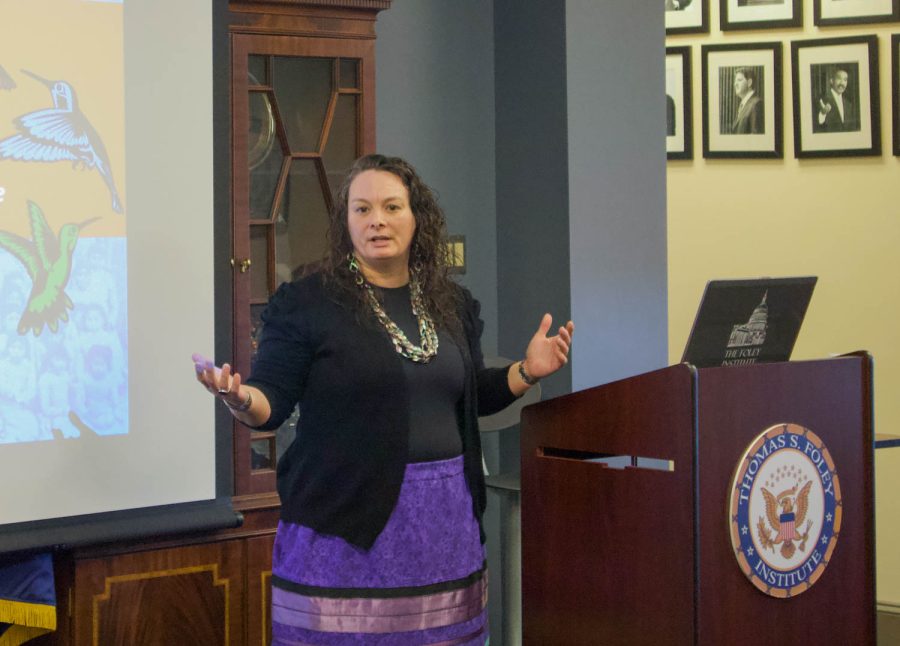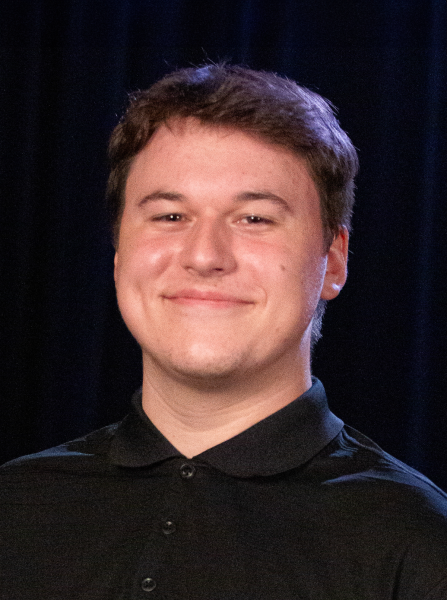Foley Talk: ‘The history of Native genocide is never a short paragraph’
Speaker discussed the genocidal history of Native boarding schools and their impact
Theresa Sheldon leading Foley Talk:“Truth, Justice, and Healing: Indian boarding schools in the U.S.” on Feb. 9.
February 10, 2023
“Whenever there is a conversation on Native people, everyone wants to know why. That history is never a short paragraph. It is always that you need to look at federal policy and you need to look back at the creation of the U.S.,” said Theresa Sheldon, director of Policy and Advocacy at the National Native American Boarding School Healing Coalition.
The National Native American Boarding School Healing Coalition aims to educate others about the truth of the boarding school policies, experiences and legacy, as well as to call for the records of these schools to become public, she said.
Sheldon led a Foley Talk Thursday titled “Truth, Justice, and Healing: Indian boarding schools in the U.S.” The focus of the talk was an investigative report by the U.S. Department of the Interior, as well as a proposed bill calling for the U.S. government to take responsibility for the effect of the boarding schools.
The bill, Truth and Healing Commission on Indian Boarding School Policies Act (S. 2907, H.R. 5444) will: look into creating a commission on a full inquiry into the Assimilative Policies of the U.S. Indian boarding schools, collect testimony from survivors, tribes and subject matter experts and create and disseminate the commission findings and recommendations, Sheldon said.
The Federal Indian Boarding School Initiative Investigative Report by DOI was the first report that had governmental acknowledgment about the harm the federal government committed through boarding schools, she said.
The report acknowledges multiple levels of colonization: death of families, taking lands, removing Natives from hunting and fishing territories and culture/teachings/religion, Sheldon said.
However, Sheldon said there is still significant information the report does not identify. The report does not identify the children placed in or attended Federal Indian boarding schools. It is estimated around 80% of Native children had gone to those schools.
“There is not a single Native alive today that has not been affected by these schools,” Sheldon said.
The boarding school would target children between the ages of 6–16 and for a majority of the time it was mandatory for the children to attend these schools. When at the boarding schools, they also were oftentimes taken to medical facilities for treatment even when they are fully healthy, she said.
“A lot of these medical facilities were doing experimental treatments on the children who are supposedly sick,” she said.
Even with the report done by the DOI, Sheldon said further review is needed to understand the impact of violence and trauma inflicted on Indian children. For that reason, the coalition is actively working on getting the bill in congress.
Due to changes in congress, the bill will have to be reintroduced, so the numbers will be different but the key points will be the same, Sheldon said.
Sheldon said the main focus of the bill is wanting the U.S. President and government to apologize for the impact that the U.S. government has had on Native families, as well as having public documentation of the people who attended the boarding schools.
On top of that, she said they are calling for more Native history to be taught in U.S. academic curriculum.
“There needs to be a change in curriculum, there are no native languages taught in high school, and in K-12 we have a severe lack of resources, but it is also hard to point out who is responsible for that,” Sheldon said.










